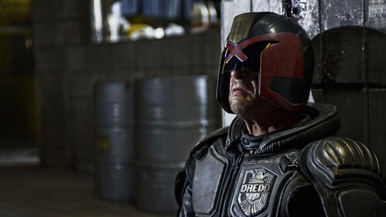Top 12 Film Industry Stories of 2012: #10
Consumers Eschew Deja Vu
By Reagen Sulewski
January 3, 2013
BoxOfficeProphets.com

The first of these largely irrelevant and unasked-for films was American Reunion, a.k.a. The Jason Biggs Employment Program, which marked the 10th anniversary of anyone caring about the American Pie franchise. A decade of pumping out juvenile straight-to-DVD spinoffs has a way of ruining a franchise's reputation that can't just be fixed by saying, “hey, we're getting the gang back together!” Mostly this served as a stark reminder of just how little the cast has done with their fame, with just Seann William Scott from the core group getting steady work (Allyson Hannigan was already famous prior to this, and doesn't count). Although it opened to a solid $21 million, that was the high water mark and it limped home to just $56 million domestic.
Johnny Depp has had a very successful last decade or so, bringing in several billion dollars' worth of box office through various projects. That's led studios to just throw money at him to make all of his pet projects, and more power to him for doing what he likes. Of course, just because Johnny Depp likes the idea of something doesn't mean that's going to be what audiences like, and his own personal weak spot for the campy vampire soap opera Dark Shadows became the summer's first flop, with just $79 million total. Ultimately this proved to be just too many things thrown into a pot for people to handle, what with the supernatural elements, the 1970s throwback and the just plain weirdness that seemed to think it was funny in and of itself.
This summer saw the wall being hit for non-traditional adaptations as well, with Hasbro's Battleship not surviving the ridicule to earn only $65 million against a $200 million-plus budget. Admittedly, overseas money helped this one out a lot more than other films, but a board game-based action film is one of those ideas where you wonder how anyone thought this even might work.
Your mileage may vary as to whether Men in Black 3 counts in this category, as while it wasn't a true reboot, it might as well have been, with Tommy Lee Jones effectively being recast as Josh Brolin. That clever bit of impersonation aside, there didn't seem to be a lot of reason for this movie to exist, and the fact that this series is continually undoing all the resolution from the previous films doesn't lend a lot of weight to the proceedings. Now, Men in Black 3 didn't do all that badly, grossing $179 million, but this is almost $100 million below what the first film grossed *15* years ago, which effectively represents the fanbase of this series being cut in half.
The hits kept not coming with Prometheus, Ridley Scott's quasi-Alien prequel, which was possibly the most buzzed about film that didn't feature superheroes coming into 2012. Although it has its passionate defenders (at this site, even!) word quickly spread that the film was not up to snuff and that there were a few, how shall we say, plot issues. A meager $126 million is almost certainly not what Fox and Scott were hoping for, and this definitely puts plans for a prequel trilogy at risk.
The ridiculousness of reboots might have hit its peak with The Amazing Spider-Man, which found itself starting from square one just 10 years after the original Spider-Man and five years after it had its Batman & Robin franchise killer. While there were some contractual reasons why this movie had to be made now, there was very little in the narratively necessary department for it. And while I'd never call the $262 million it's made a flop, it's $70 million down from Spider-Man 3, and again about half of what Spider-Man's box office represents after inflation. While it's in a better place than some other superhero franchises we could name (cough cough Superman), there is a definitely line being drawn in the sand about these endless reboots.
I'm not sure anything beat the remake of Total Recall for sheer pointlessness, however. It really hadn't been that long since the first one, and substituting Colin Farrell for an at-his-peak Arnie in the lead is nobody's idea of even a lateral move. Eliminating the Mars stuff makes even less sense, and Paul Verhoeven's penchant for satirical excess was completely beyond Len “More Blue Filters!” Wiseman. $58 million is kind of a shockingly low total for a property as well known as this one.
The Bourne Legacy knew it was taking a step downward, so points for that, but the spinoff movie that mostly took place in the shadows of the events of The Bourne Ultimatum was a tough sell for audiences, with Jeremy Renner not really stepping into Matt Damon's shoes. It dropped about $100 million from Ultimatum to $113 million, and probably nips that franchise in the bud.
Extending beyond summer, Lionsgate attempted to bring back the Judge Dredd franchise with the simply-titled Dredd, but despite solid reviews it was resoundingly rejected to the tune of just a $13 million gross. The much-delayed Red Dawn also falls into this group as well, with the laughable “North Korea invades the US” premise managing just $40 million.
The lesson that we all hope studios learn from this year? Just cool it with the remakes already – or have a solid reason to do Audiences are figuring out that these are stale, stale ideas and with tickets now costing $15 a pop in some cases, these projects are no longer a sure thing.